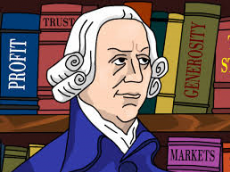
Email: ZYVC057@live.rhul.ac.uk
Total Article : 213
About Me:I'm a graduate student studying International Criminal Law and first started writing for King's News almost 4 years ago! My hobbies include reading, travelling and charity work. I cover many categories but my favourite articles to write are about mysteries of the ancient world, interesting places to visit, the Italian language and animals!

Adam Smith is one of the great thinkers of liberalism, an ideology that finds a particular foothold in Britain. By discovering Adam Smith’s outlook on political economy, stated in his renowned book ‘An Inquiry into the Nature and Causes of the Wealth of Nations’, we can immerse ourselves in a web of trade central to the economic welfare of nations worldwide; written centuries ago, this book contains to-date key moral philosophical questions and highly debated economic answers.
During Smith’s time the mercantilist idea was circulating. It stated that the world’s resources are finite, hence if one country grows rich another becomes poor which will lead to an inevitable eternal war on resources. Enlightenment defies this as, driven by notions of industrial and scientific progress, thinkers start believe we can maximise the use of resources whilst making new ones. The scientific developments of the eighteenth century influenced the positive liberal outlook of many scholars. Newton’s clockmaker was used as an analogy for economy by liberal thinkers of the time: we can set an agenda for economy but when it is running it would be disadvantageous to intervene, so the clockmaker lets it run on its own.
Adam Smith possesses interesting ideas on human nature; as humans they can be both selfish and rational like Kant believed but Smith doesn’t believe in the idea that human beings can outgrow their selfishness unlike Kant. Selfishness isn’t a bad thing when turned into production. He builds upon Montesquieu according to whom selfishness can be converted into one vice: greed. Greed brings us to produce and make things whilst overseeing the conversion of an irrational passion to a rational interest. Smith is keen on the idea of economy as a clockwork system; if all people react for their own selfish ends they can create a successful overall system. He mentions the invisible hand, a godlike hand controlling the economy which is created by each individual following his/her own interest. Having stated this, Smith does realise that the laisez-fair free market has limits. One limit is monopoly, the government should step in and restrict monopoly; the government may also interfere in the case of justice. Humans are naturally selfish, but they are also sociable. They have a conscious which arises from relationships and human interaction. Smith elaborates a theory of sympathy: as we have relationships we sympathise with others seeing their point of view making us want to do well by them and support them. Humans are born with reason and imagination as well as self-love, making humans complex. Because people are complex and have urges to be both selfish and sociable, they are inclined to be constructive and destructive of society. It is important to control humans due to the selfish side of their nature whilst allowing them autonomy at the same time. This is the problem Smith thinks about; he isn’t keen on rules but believes they are necessary. Society is governed by natural rules - the best kind of constraint, self-constraint – and artificial rules, which stop us from hurting are neighbour. Smith continues to reiterate that if you have a system which works well and allows people to be selfish in a way that benefits society the clockmaker need not intervene.
Smith’s economic model
Smith divides history into phases of evolution with the last being the commercial stage. Once this commercial phase of history has been reached there are some basic laws of motions which make the economy function. First, within the economic structure we have people driven by self-interest. Secondly, each of us develops specialisation and labour is divided. This makes us experts by saving time and benefits society as we rely on each other. States should not interfere with the economic mechanism. Smith evoked the idea of small governments restrained to their minimal and necessary functions like protection of private property without intervening in economic affairs. When the market does go down, it will correct itself. The idea that governments should not interfere by competing leads to Smith postulating that every country should specialise in what it does best relying on trade to gain what it doesn’t do well. Therefore free trade would make relationships much more rational, decreasing the amount of wars whilst increasing wealth.
Criticisms have risen from the works of Adam Smith, for example Alfred Marshall fervently poses himself against Smith’s very own definition and interpretation of the economic system whilst economist Joseph E. Stiglitz tears apart Smith’s most famous idea of the invisible hand by saying that "the reason that the invisible hand often seems invisible is that it is often not there.". Despite these criticisms and many more, the teachings of Adam Smith continue to be echoed in schools of economics, politics and philosophy worldwide.
Image: https://cdn.brainpop.com/topics/adamsmith/screenshot1.png

0 Comment:
Be the first one to comment on this article.